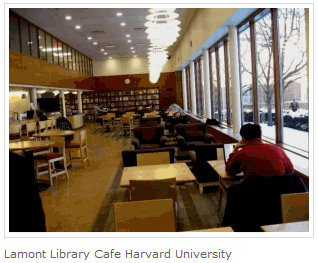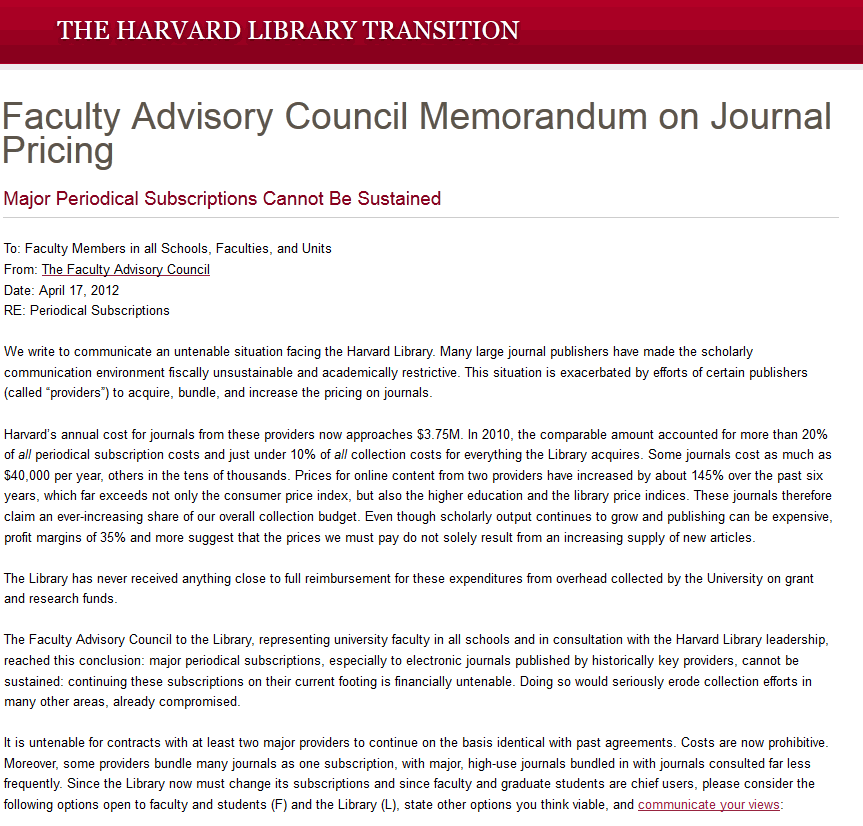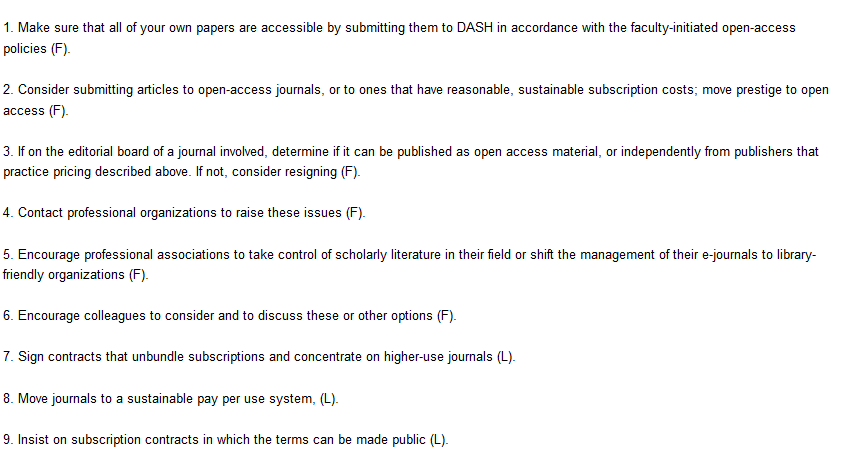|
|
|
|
|
|
|
News & Views item - April 2012 |
![]() Harvard: We Write to Communicate an Untenable Situation Facing the Harvard
Library. (April 25, 2012)
Harvard: We Write to Communicate an Untenable Situation Facing the Harvard
Library. (April 25, 2012)
The memorandum:
To: Faculty Members in all Schools, Faculties, and Units
From:
The Faculty Advisory Council
Date: April 17, 2012
RE: Periodical Subscriptions
The memo states: Many large journal publishers have made the scholarly
communication environment fiscally unsustainable and academically restrictive...
Harvardís annual cost for journals from these providers now approaches $3.75M. It concludes by asking the
university and Harvard's libraries to "consider the following options open to
faculty and students (F) and the Library (L), state other options you think
viable, and communicate your views:
journals from these providers now approaches $3.75M. It concludes by asking the
university and Harvard's libraries to "consider the following options open to
faculty and students (F) and the Library (L), state other options you think
viable, and communicate your views:
1. Make sure that all of your own papers are accessible by submitting them to
DASH
[Digital Access to Scholarship at Harvard] in accordance with the
faculty-initiated open-access policies (F).
2. Consider submitting articles to open-access journals, or to ones that have
reasonable, sustainable subscription costs; move prestige to open access (F).
3. If on the editorial board of a journal involved, determine if it can be
published as open access material, or independently from publishers that
practice pricing described above. If not, consider resigning (F).
4. Contact professional organizations to raise these issues (F).
5. Encourage professional associations to take control of scholarly literature
in their field or shift the management of their e-journals to library-friendly
organizations (F).
6. Encourage colleagues to consider and to discuss these or other options (F).
7. Sign contracts that unbundle subscriptions and concentrate on higher-use
journals (L).
8. Move journals to a sustainable pay per use system, (L).
9. Insist on subscription contracts in which the terms can be made public (L).
David Prosser, executive director of Research Libraries UK, told The Guardian's Ian Sample: "Harvard has one of the richest libraries in the world. If Harvard can't afford to purchase all the journals their researchers need, what hope do the rest of us have? There's always been a problem with this being seen as a library budget issue. The memo from Harvard [the Faculty Advisory Council] makes clear that it's bigger than that. It's at the heart of education and research. If you can't get access to the literature, it hurts research."
And Heather Joseph, executive director of the Scholarly Publishing and Academic Resources Coalition, a US-based international library membership organisation, told Mr Sample that other universities may follow Harvard's lead: "Highlighting the role of the faculty is exactly what we need to do. Libraries have been trying to ring the alarm bell about this for a while, but it's the faculty members who are the producers and consumers of the articles. They have got the keys to making significant change in this market. Having Harvard call this out in front of the faculty is a very significant move. Other universities are likely to follow Harvard's example on this. If it starts at a university with the stature of Harvard, they will take a long hard look at whether this is something that makes sense for them to do as well. People watch Harvard. There's no grey area there."
The full meno from the university's Faculty Advisory Council is reprinted below:
__________________________________________________



_________________________________________
Note: As of 2011 Harvard's endowment was listed as US$32 billion.